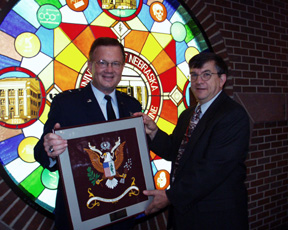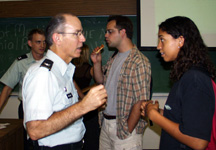 |
Maj. Gen. Roger Lempke, left, adjutant general of the Nebraska National Guard, presents a token of the Guard’s appreciation for UNMC’s support to David Crouse, Ph.D., interim vice chancellor for academic affairs. The framed art depicts the Army Medical Department Regimental Flag. |
You can imagine how happy Rachel Blake, M.D., was when she found out her medical school student loans would be paid off about three years after graduation.
In exchange for her medical services for one weekend a month and 15 days of annual training a year, the resident and Nebraska Army National Guard member receives student loan repayment, monthly pay, low cost life insurance, credits toward a military retirement and other benefits.
Recently, about 75 medical students attended a luncheon presentation on campus to learn about the benefits of belonging to the Nebraska Army National Guard. While free pizza lured some, others were enticed with the benefits the National Guard has to offer.
Signing up
First-year medical students who join the National Guard and complete a two-week officer’s basic training course can receive an estimated $6,285 in pay and tuition benefits, said Col. Chris Maasdam, M.D., a member of the Nebraska Army National Guard and Lincoln physician. With pay increases, as well as tuition benefits, students who enroll this year would receive about $11,220 in compensation during their fourth year of medical school, he said.
Although military officers don’t sign formal contracts, the typical service commitment is eight years. Students who join in their first year could have nearly seven years of an eight-year commitment completed by the time they finish their residencies.
Residents also may qualify for student loan repayment through various programs, including one in the third year of residency, or after completing residency.
“We’re user-friendly,” said Dr. Maasdam, a 1975 UNMC College of Medicine graduate. “The students get half of their drill weekend to study. The other half is to learn what we do as military medical professionals.”
He said students process medical evaluations, train medics, and hone their physical exam skills, including performing medical tests.
Serving one’s country
The primary mission of physicians in the National Guard is to ensure its members qualify medically to serve and deploy overseas. In times of war, physicians can be called to active duty. Although Nebraska typically keeps its positions filled, keeping enough physicians to perform this mission is a constant battle.
“Nationally, we’re short of doctors in the military,” said Chief Warrant Officer II John Ayers, officer recruiter, Nebraska Army National Guard. “We’re recruiting all the time. Nationally, they want to put in as many medical students as possible to offset those who choose to move to a different state or separate from the Guard later.”
 |
Second-year medical student Nicole Sherman talks with Col. Chris Maasdam, M.D., a member of the Nebraska Army National Guard and Lincoln physician. |
A handful of medical students currently serve in the National Guard.
One of them, Laura Ortman, is a third-year medical student and diesel truck mechanic who joined the National Guard before she started medical school. “I thought it would be fun,” Ortman said. “I’ve been to Europe three times for my two weeks of annual training.”
Ortman, who is a member of the 267th Ordnance Company, has applied to transfer into the National Guard’s medical unit. It will be easier being attached to a medical unit, she said, because as a mechanic, she had to take a one-month leave of absence from her summer commitments in medical school to attend annual training.
Combining medicine with the military
For some specialties, residents can earn $1,058 per month and qualify for the student loan repayment during their last year as a resident. Dr. Maasdam said leaving Nebraska to serve a residency in another state is not a problem. Guard members can transfer to other states.
As with most military obligations, the possibility and concern of being deployed to serve on active duty arise. However, Dr. Maasdam said, medical students and residents are not deployed.
Dr. Blake, a captain in the National Guard and colleague, Capt. Jaime Dodge, M.D., both UNMC alumni, are doing family medicine residencies in Lincoln. During the presentation, they shared their thoughts and answered questions.
Dr. Dodge said he joined because he’d always wanted to be in the military, but also wanted to pursue a medical career.
“If you want to make the most of it, you can,” Dr. Dodge said. “I went to the flight surgeon course and also had the opportunity to fly in helicopters. It’s fun to put on a uniform and do something different and I feel like I’m giving back. It’s great camaraderie too.”
UNMC recognized for its support
In appreciation for UNMC’s support of the National Guard, Maj. Gen. Roger Lempke, adjutant general of the Nebraska National Guard, presented UNMC with framed artwork of the Army Medical Department Regimental Flag. Lempke said he was pleased UNMC supports its medical students’ and residents’ memberships in the National Guard, as well as the role UNMC plays in support of homeland security.
David Crouse, Ph.D., interim vice chancellor for academic affairs, accepted the gift on behalf of UNMC Chancellor Harold M. Maurer, M.D.
“We appreciate the students getting financial and other incentives,” Dr. Crouse said. “It’s also a great opportunity for them to serve our country.”